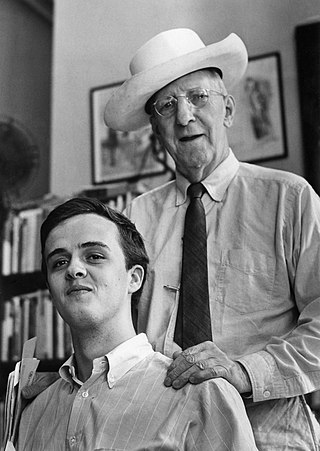Related Research Articles

Wallace Stevens was an American modernist poet. He was born in Reading, Pennsylvania, educated at Harvard and then New York Law School, and spent most of his life working as an executive for an insurance company in Hartford, Connecticut. He won the Pulitzer Prize for Poetry for his Collected Poems in 1955.
Robert L. Hass is an American poet. He served as Poet Laureate of the United States from 1995 to 1997. He won the 2007 National Book Award and shared the 2008 Pulitzer Prize for the collection Time and Materials: Poems 1997–2005. In 2014 he was awarded the Wallace Stevens Award from the Academy of American Poets.

Harmonium is a book of poetry by American poet Wallace Stevens. His first book at the age of forty-four, it was published in 1923 by Knopf in an edition of 1500 copies. This collection comprises 85 poems, ranging in length from just a few lines to several hundred. Harmonium was reissued in 1931 with three poems omitted and fourteen new poems added.

James Vincent Tate was an American poet. His work earned him the Pulitzer Prize and the National Book Award. He was a professor of English at the University of Massachusetts Amherst and a member of the American Academy of Arts and Letters.

Mark Doty is an American poet and memoirist best known for his work My Alexandria. He was the winner of the National Book Award for Poetry in 2008.
Gerald Dawe is an Irish poet.
"The Plot Against the Giant" is a poem from Wallace Stevens's first book of poetry, Harmonium. It was first published in 1917, so it is in the public domain.

Joy Harjo is an American poet, musician, playwright, and author. She served as the 23rd United States Poet Laureate, the first Native American to hold that honor. She was also only the second Poet Laureate Consultant in Poetry to have served three terms. Harjo is a member of the Muscogee Nation and belongs to Oce Vpofv. She is an important figure in the second wave of the literary Native American Renaissance of the late 20th century. She studied at the Institute of American Indian Arts, completed her undergraduate degree at University of New Mexico in 1976, and earned an MFA degree at the University of Iowa in its creative writing program.
Paul Mariani is an American poet and is University Professor Emeritus at Boston College.
"Invective Against Swans" is a poem by Wallace Stevens from his first book of poetry, Harmonium (1923).
"The Comedian as the Letter C" is a poem from Wallace Stevens's first book of poetry, Harmonium (1923). It was one of the few poems first published in that collection and the last written for it. John Gould Fletcher frames the poem as expressing Stevens's view "that the artist can do nothing else but select out of life the elements to form a 'fictive' or fictitious reality."
"Anecdote of the Prince of Peacocks" is a poem from Wallace Stevens's first book of poetry, Harmonium (1923). It was one of the few Harmonium poems first published in that volume, so it is still under copyright. However, it is quoted here as justified by Fair use to facilitate scholarly commentary.
"The Weeping Burgher" is a poem from Wallace Stevens's first book of poetry, Harmonium. Originally published in 1919, it is in the public domain.
"Depression Before Spring" is a poem from Wallace Stevens's first book of poetry, Harmonium (1923). It was first published in 1918 and is therefore in the public domain.
"The Cuban Doctor" is a poem from Wallace Stevens's first book of poetry, Harmonium. It was first published in the journal Poetry in October 1921, so it is in the public domain.
"Anecdote of the Jar" is a poem from Wallace Stevens's first book of poetry, Harmonium. Wallace Stevens is an important figure in 20th century American poetry. The poem was first published in 1919, it is in the public domain. Wallace Stevens wrote the poem in 1918 when he was in the town of Elizabethton, Tennessee.
"Life is Motion" is a poem from Wallace Stevens's first book of poetry, Harmonium. It was first published in 1919, so it is in the public domain.
"Colloquy with a Polish Aunt" is a poem from Wallace Stevens's first book of poetry, Harmonium. It was first published in 1919 and is included in The Collected Poems of Wallace Stevens (1954).
"Hymn From A Watermelon Pavilion" is a poem from Wallace Stevens's first book of poetry, Harmonium. It was first published in 1917, so it is in the public domain.
"The Death of a Soldier" is a poem from Wallace Stevens's first book of poetry, Harmonium. The poem uses free verse to describe the death of a soldier.
References
- ↑ Poets.org, https://poets.org/poem/earthy-anecdote#:~:text=Every%20time%20the%20bucks%20went,The%20bucks%20clattered
- ↑ BACIGALUPO, MASSIMO. “Wallace Stevens and the Firecat.” The Wallace Stevens Journal, vol. 21, no. 1, 1997, pp. 94–98. JSTOR, http://www.jstor.org/stable/44884463. Accessed 26 Feb. 2024.
- ↑ Strom, Martha. “Wallace Stevens' Revisions of Crispin's Journal: A Reaction Against the 'Local.'” American Literature 54 (1982): 258–76.